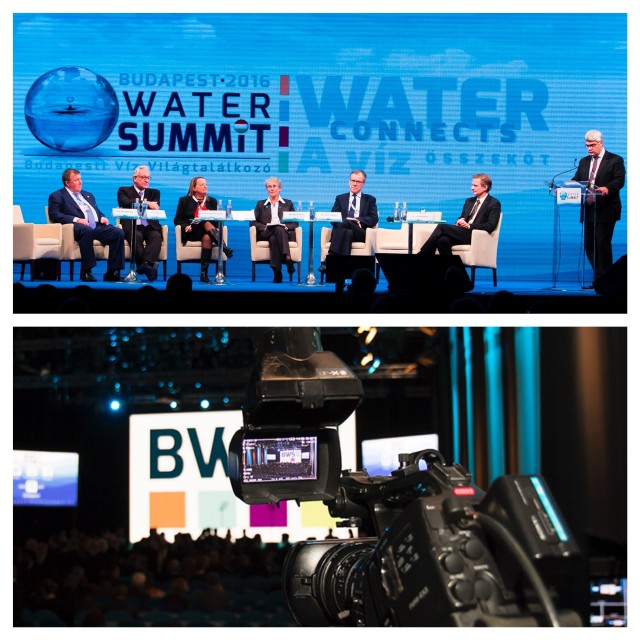At Budapest Water Summit 2016, IIB Chairman presented possibilities for IFIs to implement water-related initiatives

In the context of developing the strategic direction of environmental responsibility in its operations, the International Investment Bank (IIB) participated in the Budapest Water Summit 2016, held in Hungary on November 28-30, 2016. The Chairman of the IIB Board, Nikolay Kosov, was one of the speakers in the summit’s main programme and shared with the members of the High Level Panel on Water (HLPW) his views on the role of multilateral development banks (MDBs) in financing water-related projects, on promising financial instruments in this area and on problems of the corresponding financial regulation.
The forum, organised for the second time by the Government of Hungary under the patronage of the country’s President, is a large-scale platform for discussions on issues of water resource management, the rational use of such resources, sanitation and hygiene, use of water-saving technologies and ensuring access to water supply for the population. More than two thousand delegates attended the plenary and thematic sessions, including the heads of states and governments, ministers, high-level representatives of the UN and other international organisations, top municipalities officials, research and non-profit organisations as well as business representatives from more than 100 countries worldwide.
As an expert at the session «How to get more green?», Nikolay Kosov commented on IFIs’ investment capacity and banking instruments for financing environmental projects. “Given the unique nature of such institutions, IFIs are ideally positioned to solve international problems involving several countries and to engage the private sector in the process. The IIB and other MDBs provide long-term financing and reduce risks for private investors,” – said the Chairman of the Board during the session. At the same time, the Bank’s chief executive stressed that the current financial regulation and the methodology of rating agencies limit the ability to support riskier projects related to sustainable development, including in the area of water resources.
N. Kosov brought up these issues also during the working lunch with the members of the HLPW, proposing to consider the creation of a global database of water-related projects in need of funding. Such a database will contribute to a comprehensive understanding of the problem on a global level and to a better coordination of its solution. Meanwhile, international water-related initiatives could be implemented with the use of such effective financial instrument as special bond issues by development banks, guaranteed by the countries, where the projects are being implemented.
The results of the summit demonstrate that Hungary – the third largest shareholder of the IIB – is a world leader in promoting the discussion on problems associated with water resources. The President of Hungary, János Áder, is one of the 12 members of the HLPW, initiated by the UN Secretary General and the President of the World Bank Group in April this year. At an expo, associated with the summit, Hungarian companies presented their unique technological solutions, and the conclusion of the summit led to the elaboration of a number of measures aimed at implementing the Sustainable Development Goal 6 (SDG-6) on water resources, adopted by the UN in September 2015.
The relaunched IIB is becoming a more and more socially and environmentally responsible institution. In 2015, the Bank adopted Environmental and Social Impact Assessment Guidelines with corresponding criteria for selecting investment projects. Since last year, the IIB is also providing grants for environmental programmes, the last of which represents a grant for WWF-Hungary to finance the development of the Water Risk Filter – WWF’s flagship online tool for water monitoring.


